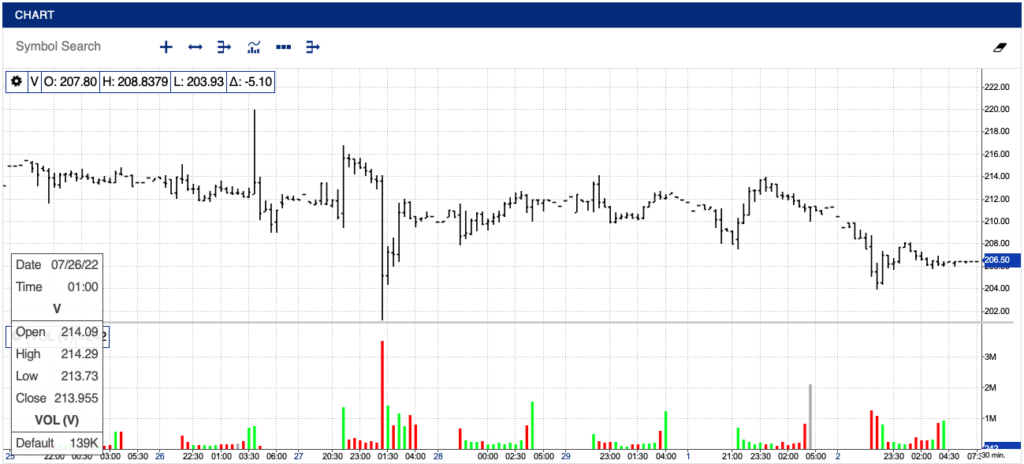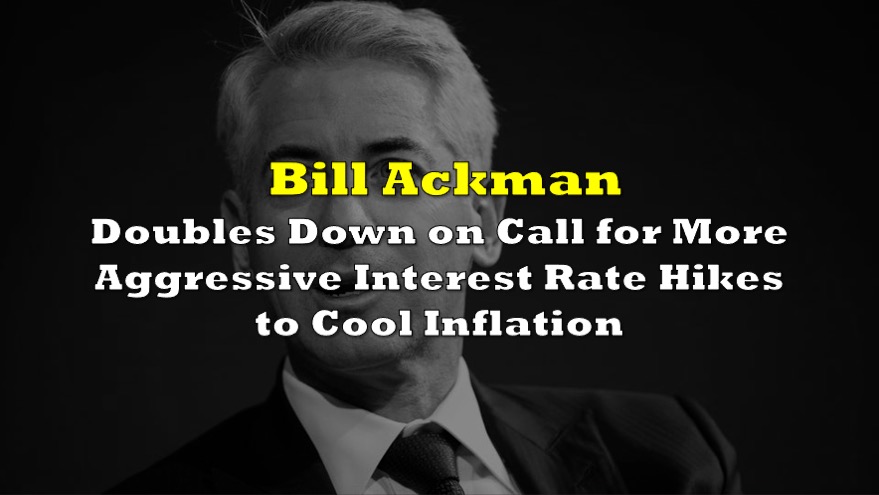The ongoing saga of MindGeek’s–the parent company of adult site Pornhub–troubled policy in policing their pornographic content of illegal underage and nonconsensual videos has recently hit a dramatic turn.
One of the lawsuits filed against the firm involves global payment platform Visa (NYSE: V) as one of the defendants, alleging the latter as an enabler of MindGeek’s supposed criminal act by continuing to be its payment provider. The financial services firm filed a motion to dismiss its involvement, arguing that it isn’t culpable of any wrongdoing.
However, the judge handling the case disagrees.
And as a proverbial icing on the cake, Visa is also facing additional pressure from Pershing Square CEO Bill Ackman who has taken a great interest in the case.
Yesterday, a Federal judge rendered a decision https://t.co/z7ImYJgWHi that no one has likely read. You should. The lawsuit is against MindGeek, the largest internet porn company in the world, and @Visa. Both are culpable. Visa’s conduct here is inexcusable,
— Bill Ackman (@BillAckman) July 30, 2022
Child Porn Problem: Where was MindGeek’s mind?
More than just a video
At the center of the case being heard in a California district court is Serena Fleites, whose explicit video taken non-consensually by her then-boyfriend when she was 13 years old has been uploaded on MindGeek’s flasghip site Pornhub. Despite multiple attempts to ask the company to take the video down, the request has been met with delays and multiple reuploads to other sites.
Fleites, then a minor, impersonated her mother to ask the site to take down her video but while MindGeek seems to have acknowledged the request, it “took a few weeks to remove the video.”
“In this internet age, a week might as well be an eternity because content constantly and instantaneously proliferates and disseminates. The video was downloaded by users and reuploaded several times, and Plaintiff regularly received messages from strangers containing hyperlinks to the video in the years following the original posting,” read the plaintiff’s motion.
The plaintiff reiterated that MindGeek earned advertisement revenue not only from the main video but also “from the reuploads [onsite] and… to its other pornographic websites as well.”
When the videos would be reposted, Fleites would ask the company to take it down. But, MindGeek would ask her “to provide photographic proof that she was the child depicted in the video before removing [the videos].” The court said it is “at a loss” why this was necessary.
The incident led to the plaintiff’s life “[spiraling] out of control,” marred with substance addiction, attempts to take her life, and being forced to create more sexually explicit content to fund her needs as a minor. Some of these videos were also non-consensually uploaded to MindGeek’s Pornhub and then reuploaded by the firm on its other sites.
“While MindGeek profited from the child porn featuring Plaintiff, Plaintiff was intermittently homeless or living in her car, addicted to heroin, depressed and suicidal, and without the support of her family,” the plaintiff’s legal counsel added.
Making money out of porn
MindGeek makes most of its money from ad revenues through its subsidiary, advertising platform TrafficJunky–accounting for around 50% of the firm’s revenue. But the plaintiff argues this is not just a simple, run-off-the-mill ad placements.
“To reach their intended audience, advertisers can build campaigns around keywords like ’13yearoldteen’ and ‘not18’; indeed, they can even target ads to people searching the term ‘child rape’ in Japanese,” the motion read.
Similarly, videos driving higher traffic are priced higher for ad placements, incentivizing the company to prioritize website views. “Disturbingly, child porn drives web traffic,” the motion added.
Apparently, to police their content, MindGeek employed “a barebones team of ‘as few as 6 but never more than about 30 untrained, minimum wage contractors’.” Not only is this a very understaffed team, they are also allegedly incentivized depending on the number of third-party video uploads they approve for publishing.
“Such an incentive structure suggests that content moderation was not the goal,” the court commented.
MindGeek, to increase traffic on its other sites, reuploads content from Pornhub to its other platforms, even those “it had been forced to disable.” The lean team who police the uploads are also tasked to do “formatting” to make sure that the title and tags of the video are easily searchable not only on porn sites but on search engines like Google as well.
“It seems that MindGeek often used this formatting process to dog-whistle to persons on the hunt for child porn. For example, they could tag a video with ‘barely legal teen sex’ so that the video appears on a Google search (or on a search on the porn site itself) for ‘teen sex’,” the motion read.
When victims would contact MindGeek to ask their videos to be taken down, “it would keep the video’s webpage with its title, description, tags, and comments” when it takes down a video. This keeps the video searchable on search engines and the link will still lead traffic to the site, albeit the webpage would say that the content is no longer available.
Your man, Corey Urman
The plaintiff also alleges MindGeek vice president Corey Urman led the company’s efforts “to silence and intimidate victims and advocates,” allegedly using false identities or ordering other people to do his bidding.
“For example, after an activist by the name of Laila Mickelwait published an op-ed in the Washington Times describing child porn on Pornhub, Urman allegedly wrote an email to the media under the name ‘Blake White,’ wherein he insinuated that Mickelwait was a member of an anti-LGBTQ, anti-women group,” the motion read.
Urman also allegedly told Insider.com “that Pornhub immediately removes illegal content when notified,” but under the same pseudonym.
Personally, Fleites experienced Urman’s alleged online operative under the pseudonym “EyeDeco,” who would “harass and intimidate activists and victims and release their personal information.” This online identity stated in a social media post that Fleites “seems like she knows and has known for quite some time exactly what she is doing aka #grifting.”
Pay for your (child) porn: How is Visa being involved legally?
Payment gateway or gatekeeper?
Here’s where Visa comes in: the plaintiff believes that the global payment platform has a supposed influence on MindGeek’s business; upon knowing these illegal acts are being conducted, the firm could have put a stop to it by severing business ties. Instead, the payment company decided to continue the transactions after asking the adult site firm to merely maintain “pretextual window dressing claims that it had technology, processes, and policies in place to prevent such content.”
“Visa was aware of MindGeek’s trafficking venture and explicitly agreed with MindGeek to process the financial transactions from which the defendants profited from the venture,” the plaintiff argued.
In contrast to fellow payment platform PayPal who cut ties with MindGeek as it “explicitly prohibits the use of [its] services for the sale of materials that depict criminal behavior,” Visa continued to do transactions with the company.
“Maintaining a neutral stance under the law is vital for the free flow of commerce,” said Visa when it was under fire for continuing business.
But Visa seems to have yielded momentarily to pressure when a New York Times piece on the site’s child pornography problem had been published, suspending business transactions with the adult site firm pending investigations. As a potentially causative result, “MindGeek took down over 10 million unverified videos from its [sites], constituting over 80% of its content.”
However, that was short-lived; Visa eventually resumed its business partnership with MindGeek.
Instead, they continued to allow their cards to be used for B2B business, that is, the purchase of ads on these same tube sites and for subscriptions to “premium” content, together about 90% of the business. Hours later, MindGeek began restoring its illegal content library.
— Bill Ackman (@BillAckman) July 30, 2022
In a CNBC interview, Fleites’s counsel also said that Visa CEO Al Kelly should be personally held liable for the company’s alleged involvement in the case.
Should Visa CEO Al Kelly be held criminally liable for what $V has done here? @andrewrsorkin asks Michael Bowe, the lead attorney for the plaintiff in Fleites vs. MindGeek.
— Squawk Box (@SquawkCNBC) August 1, 2022
“When they know that their merchants are engaged in crime, and he knew… yes,” says Michael Bowe. pic.twitter.com/y3VJsoa642
On the other hand, Visa’s main contention on its motion to dismiss lies heavily on its culpability related to the alleged illegal upload of the underage and nonconsensual content. The firm argues that the harm suffered by Fleites after the fact “depend entirely on the independent actions of parties other than Visa.”
“Plaintiff alleges that her injury stems from third parties who took videos and uploaded them to MindGeek sites, from MindGeek’s maintenance of sites on which the videos could be uploaded, and from MindGeek’s lack of monitoring of its sites and failure to remove the videos,” Visa argued in its motion.
This projects the same spirit of the global payment platform’s earlier statement that essentially maintains it is merely a payment gateway.
In its defense, Visa claims it has no liability, protested that the payments industry would collapse if it did, and attempted to dismiss the suit taking comfort in its statement “Maintaining a neutral stance under the law is vital for the free flow of commerce.”
— Bill Ackman (@BillAckman) July 30, 2022
Here lies Visa(‘s involvement)
On this argument by Visa, the judge disagrees.
“Plaintiff is suing MindGeek for…’benefit[ting] financially’ from the child porn featuring Plaintiff, knowing or in reckless disregard of the fact that Plaintiff was a minor when such videos were produced… That is where Visa enters the picture in full view, unobscured by the third parties that it attempts to place between itself and Plaintiff,” the court decision read.
The payment company also tried to further distance itself from the narrative, saying it sits atop acquirers who directly deal with merchants like MindGeek, but the court said the company submitted no declaration to support this assertion. Instead, it rehashed a payment network structure it used from another appeal.
“Visa cannot simply borrow the record of another case—or another court’s explanation of the record of a separate case—in lieu of introducing facts into the record of this case,” the court noted.
Simply put, Visa is being tied to the case as MindGeek’ actions that further inflicted injuries on the plaintiff are characterized by its monetization goals.
“If not for its drive to maximize profit, why would MindGeek allow Plaintiff’s first video to be posted despite its title clearly indicating Plaintiff was well below 18 years old? Why would MindGeek stall before removing the video, which Plaintiff alleges had advertisements running alongside it?” the court reasoned.
On another note, while Visa argues that MindGeek’s monetization goal and the corresponding actions to serve it are solely on the adult site firm’s control, the court said that continuing to recognize the firm as a legitimate merchant despite the knowledge of illicit nature ties the payment platform back to the case.
“With that decision—which Visa and Visa alone controlled—in place, the means to profit from child porn was ensured, and MindGeek filled in the gaps to seize the opportunity, promulgating the profit-maximizing policies and practices described above that so damaged Plaintiff’s life,” the court said.
The court drove the point further by saying that if Visa was aware of the child porn content on MindGeek’s sites, “then it was aware that it was processing the monetization of child porn.”
As support to this argument, the court cited back MindGeek’s decision “to remove 10 million of its videos, or a staggering 80% of its content” after Visa decided to temporarily suspend its dealings with the adult site firm. This underscores the payment giant’s supposed “sway” on the company’s operations.
As part of its argument, Visa claims that should the court accept the plaintiff’s assessment of the payment platform’s involvement in the case, it would “upend the financial and payment industries.” Again, the judge disagreed.
“Visa is not being asked to police ‘the billions of individual transactions it processes each year.’ It is simply being asked to refrain from offering the tool with which a known alleged criminal entity performs its crimes. That is not a tall order and does not spell out an existential threat to the financial industry,” the court decision said.
Coming out of “short” retirement?
The Ackman variable
Adding further twists to this brouhaha, Ackman seems to have taken a personal interest on the case, which he said stemmed from reading the aforementioned New York Times piece. He tweeted the court’s decision and uploaded it on his company’s website for reference, as well as narrated the personal actions he took to call out the chief executives of MindGeek’s payment platform partners–including Visa.
I was successful in reaching the CEO of MC who took my concern seriously. Within 5 days, MC had shut down the site. 5 days later Visa followed suit. Within a day or so, MindGeek removed >10m illegal videos, 80% of its content.
— Bill Ackman (@BillAckman) July 30, 2022
Ackman has been calling out Visa for the same arguments outlined by the plaintiff and seconded by the court, supporting the claim that the global payment platform essentially enabled MindGeek to proliferate and procrastinate on its child porn problem.
"The ultimate regulator is actually Visa. Visa tomorrow could shut down MindGeek," says @BillAckman $V pic.twitter.com/FnFyqE1lVp
— Squawk Box (@SquawkCNBC) August 2, 2022
Given his prominence in the industry, Ackman has been gaining traction and adding pressure on the payment platform.
Thanks @BillAckman for this wonderful $V short and for fighting for the right cause. https://t.co/Y6L0kz4qSE
— fried_comrade (@MadMax25678931) August 2, 2022
A $V short?
In March this year, Ackman announced that his activist short seller days are over. But his actions related to the MindGeek-Visa case projects spitting image of those times, prompting many to ask if he has a short position on the global payment platform.
— LST (@LongShortTrader) July 30, 2022
Visa initially fell as much as 5% on the day it reported its fiscal Q3 2022 earnings, when it mostly beat the financial estimates on the street.
After the court decision was handed down over the weekend–and add to it Ackman’s pronouncements that followed–shares fell a further 0.5%. The company then last traded at around US$206, falling even more by 2.41% on the day.

$V: Visa 3Q'22 Earnings Results vs. Consensus$MA $SQ $PYPL pic.twitter.com/kot3h4ANU4
— Consensus Gurus (@ConsensusGurus) July 26, 2022
$GOOGL misses and is green $V kills it and goes red. If this is not a sign for you to steer clear of this market, idk what to tell you #StockMarket
— itsjohn (@itsjohnptran) July 26, 2022
Is there a reason why $V just fell to earth? pic.twitter.com/sIafETjqkC
— Virak (@MR_TSX) July 27, 2022
Ideally you would want stock buybacks to look like the inverse of the stock price, not like the stock price chart$V pic.twitter.com/ZrNK4MhiYE
— Leandro (@Invesquotes) August 1, 2022
However, Ackman tweeted that he has “no economic stake” in the company nor the issue but he believes “this is one of the most egregious corporate governance failures [he has] witnessed.”
Seeing that this is rectified and the victims recompensed for the harm they have endured has inspired my involvement.
— Bill Ackman (@BillAckman) August 1, 2022
On MindGeek’s part, since its child pornography conundrum has been exposed, it has been facing multiple lawsuits and class action suits from alleged victims of the illicit acts. The company also saw the resignation of its CEO Feras Antoon and COO David Tassillo, whose exits are reportedly rooted in this kerfuffle.
For Visa, this legal problem adds to the potential windfall of a bill introduced in the US Senate that aims to increase the competitiveness within the credit card industry and to “dismantle the Visa-Mastercard duopoly.”
Increasing choice in the credit card industry means lower fees for business owners and customers. I’ve introduced the bipartisan Credit Card Competition Act of 2022 to help dismantle the Visa-Mastercard duopoly.
— Dick Durbin (@DickDurbin) August 2, 2022
The legal battle is not over. The contention now lies in proving that Visa was, in fact, an enabler of MindGeek’s child porn problem.
A favorable decision for Fleites stands as a win to battle this problem; and maybe, alongside that, a win for short positions.
Information for this briefing was found via the companies mentioned. The author has no securities or affiliations related to this organization. Not a recommendation to buy or sell. Always do additional research and consult a professional before purchasing a security. The author holds no licenses.









